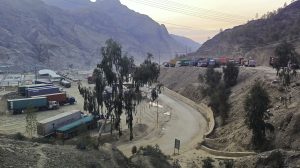Pakistan’s defense minister was in Afghanistan on Wednesday, meeting with officials there in an effort to resolve this week’s closure by the Taliban administration of a key border crossing between the two neighboring countries, officials said.
Defense Minister Khawaja Mohammad Asif’s trip to Kabul and his meeting with Mullah Abdul Ghani Baradar, the Taliban-appointed deputy prime minister for economic affairs, comes as tensions have increased between Afghanistan and Pakistan in recent months.
Taliban security forces on Sunday closed the Torkham border crossing with Pakistan and on Monday traded fire with Pakistani border guards. The exchange wounded a Pakistani soldier. The border crossing has since remained shut, hampering trade on both sides of the troubled boundary.
The Taliban government in Kabul said Torkham was closed because of Pakistan’s alleged refusal to allow Afghan patients and their caretakers to enter Pakistan for medical care without travel documents.
For Pakistan, the crossing is a vital commercial artery and a trade route to Central Asian countries. But Islamabad has also accused the Afghan Taliban of providing sanctuary for Pakistani militants whose cross-border attacks into Pakistan have led to a spike in violence in the region.
Since Sunday’s closure of Torkham, more than 6,000 trucks with goods, including vegetables, fruit, and other perishable food items, have been stuck on the Pakistani side of the border.
Pakistan’s Foreign Ministry confirmed that Asif was in Kabul, saying only that he was there to discuss security-related matters, including counterterrorism measures. Two Pakistani security officials, speaking on condition of anonymity to discuss border issues, told The Associated Press that Torkham’s closure was top of the agenda.
In Kabul, a statement issued by Baradar’s office about Asif’s visit said the two sides discussed the current situation at the crossing.
According to the statement, Baradar told the Pakistani delegation that “necessary facilities should be provided for all passengers” at Torkham and also at Spin Boldak, another trade route located to the south, across from Chaman in Pakistan’s restive southwestern Balochistan province.
Baradar was also quoted as saying “special facilities” should be provided for the transportation of patients needing emergency medical care.
“The Pakistani side assured the Islamic Emirate of Afghanistan that it would resolve the mentioned issues and … work quickly on this matter,” the statement said. Baradar also stressed it was important “to separate commercial and economic issues from political and security issues so that it does not become prey to politics.”
Meanwhile, Ziaul Haq Sarhadi, a director at the Pakistan-Afghanistan joint Chamber of Commerce and Industry, deplored the traffic halt at Torkham.
“Miles after miles you can see trucks loaded with various items, and the drivers are waiting for the reopening of the Torkham border,” he told the AP. He said Afghan traders were also worried as the closure has caused problems on both sides of the border.
Closures, cross-border fire, and shootouts are common along the Afghan-Pakistan border. Each side has in the past closed both Torkham and Chaman for various reasons.
The Taliban seized power in Afghanistan in August 2021 as U.S. and NATO troops were withdrawing from the country after 20 years of war. Like the rest of the world, Pakistan has so far not recognized Afghanistan’s Taliban government. The international community has been wary of the Taliban’s harsh measures, imposed since their takeover, especially in restricting the rights of women and minorities.

































